Are you tired of doing small, repetitive tasks all day — leaving you minimal time to spend with your patients?
Do you think the endless mounds of administrative tasks are jeopardizing the growth of your business?
Then it might be time for you to hire a virtual office assistant.
This article will go into detail about what a virtual office assistant is, the types of duties they perform, compare virtual and in-office assistants, and more so that you can decide if a VA is a good fit for your practice.
What is a virtual office assistant?
A virtual office assistant (VA) is an independent contractor or entrepreneur who typically handles essential office admin tasks from a virtual setting (usually their home offices). These professionals have one or more clients that they work with regularly.
They perform many of the same tasks as secretaries and administrative assistants, except they are not physically present in the office.
The employment of secretaries and administrative assistants is predicted to experience a decline of 8% from 2021–2031.
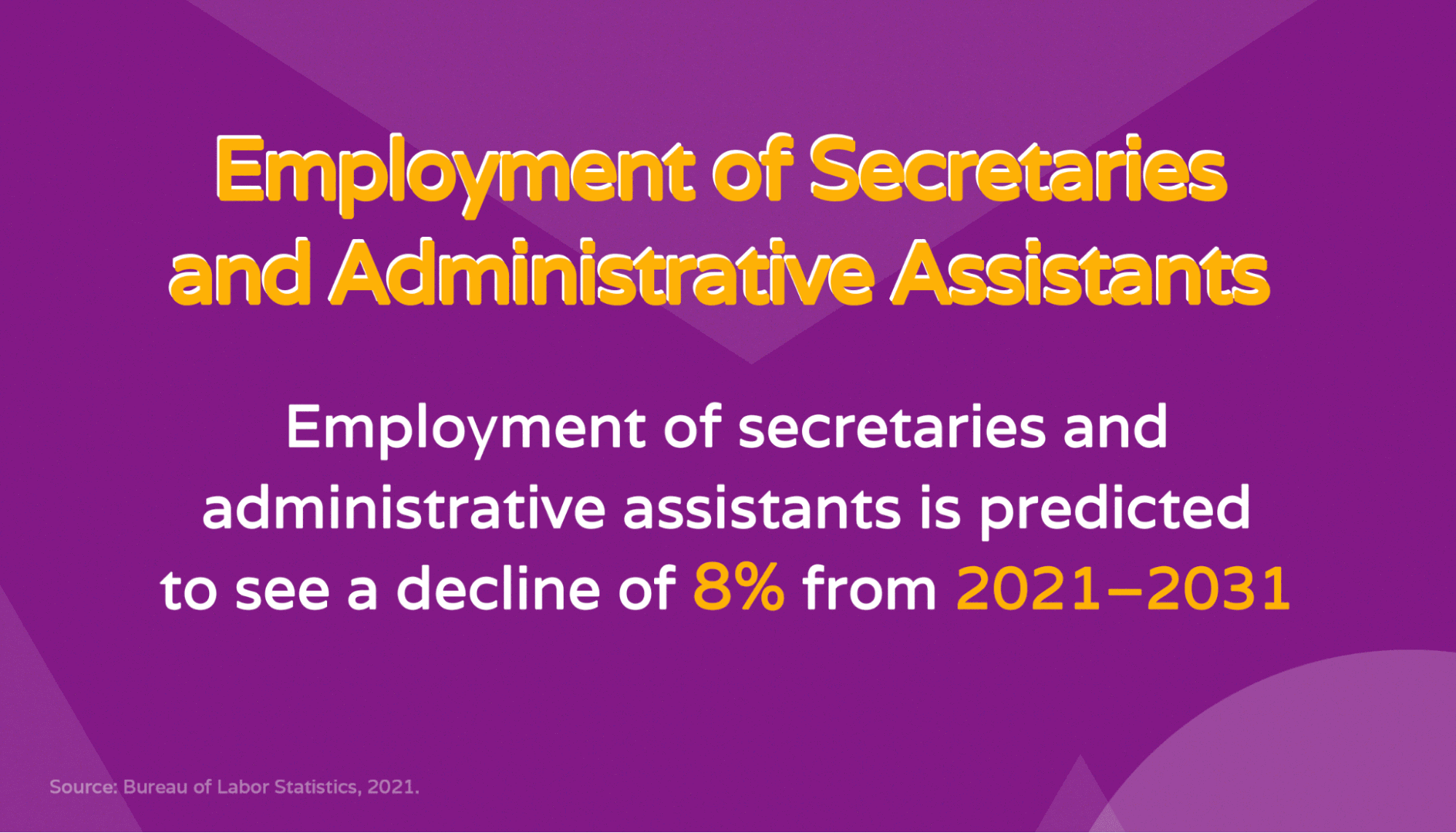
This could partly be because virtual assistants are a better option for many businesses since they only require someone who can help them lighten the overall admin workload but they don’t need them in the office.
When you hire a Healthcare Virtual Assistant from Hello Rache you only pay for what you need. Whether that’s full time support or ad hoc vacation cover, our virtual assistants flexibly meet your requirements with no ongoing commitment.
Duties of a virtual office assistant
Virtual office assistants can help with many tasks. These tasks may vary from business to business based on the types of services it offers and the type of clients it serves. Generally, these are the most common duties.
1. Data entry
Virtual office assistants will enter information or update records in a database. This entails receiving paper records of patient information and transcribing them into an electronic health record (EHR) system.
They’re responsible for keeping the system up to date and organized at all times so that doctors can access the information easily whenever they need it.
Learn more about the advantages of outsourcing medical data entry.
2. Phone calls and emails
Your VA will ensure that all inbound calls and emails from clients and suppliers are answered promptly.
They’ll answer all of the questions that they have the answers to and will be required to escalate more complicated questions to the appropriate personnel.
3. Managing office supplies
Whenever office supplies run out, your VA can order new supplies and arrange delivery dates with your suppliers. Often, they’ll be able to order supplies in advance on a weekly or monthly basis as they start to monitor when your supplies tend to run out.
This means you’ll always have stock and won’t have to worry about it running out when you’re in the middle of an appointment.
4. Making travel arrangements
Your virtual office assistant will be responsible for keeping your schedule updated and making any travel or other arrangements you need. They can also take care of your internal staff members’ schedules if you ask them to put them on their to-do lists.
5. Scheduling patient appointments
When clients need help booking or rescheduling appointments, your VA will help them and make sure that no double bookings are made.
They can also follow up with patients whenever they miss their appointments.
6. Bookkeeping
Your VA can take care of your bookkeeping by managing expenses and tracking income to keep your books and databases updated at all times. This way, you can access any information you need and won’t have to worry about uneven balances later.
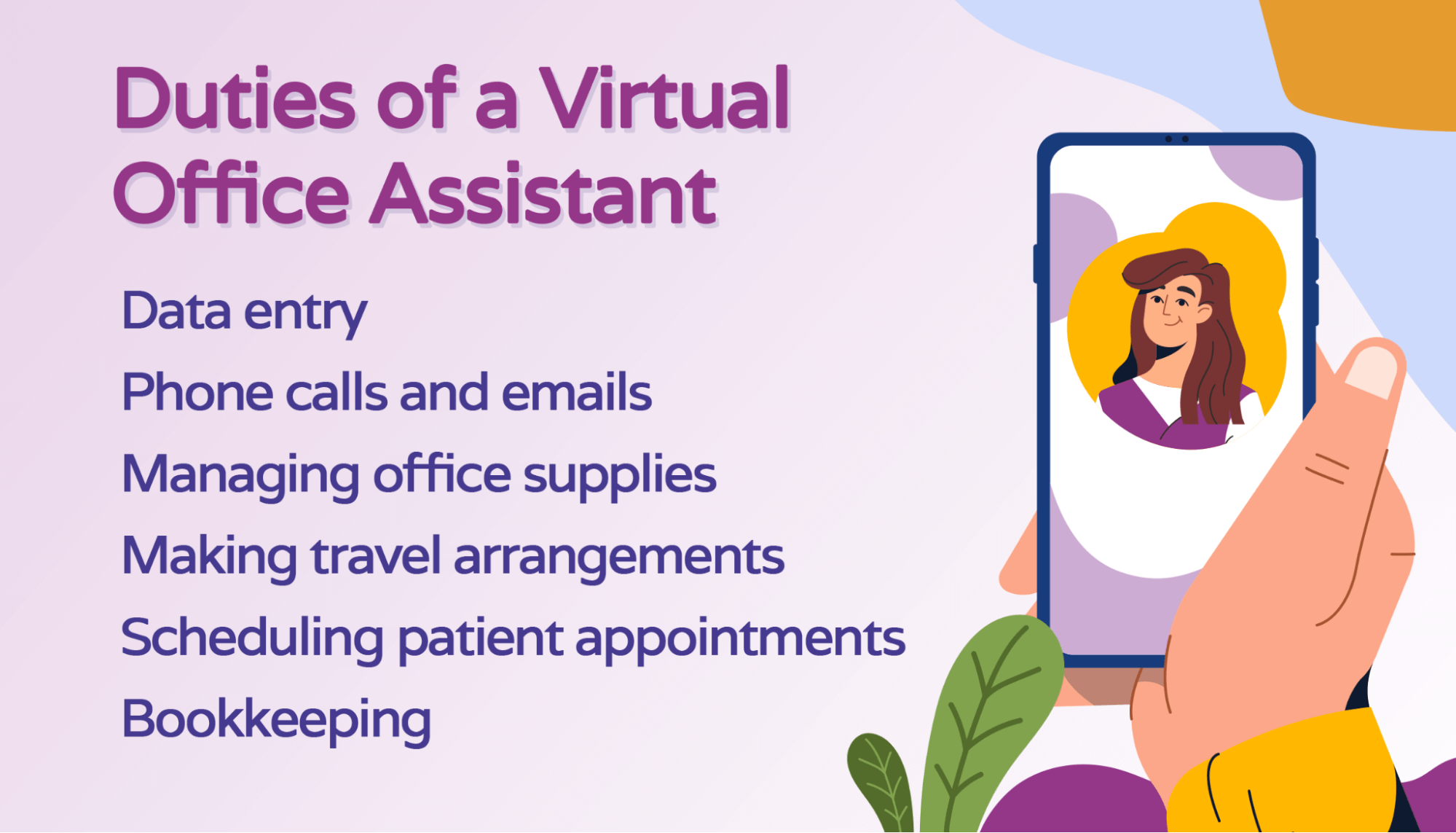
Some virtual assistants will also offer additional services. However, keep in mind that you may have to pay more for these kinds of services, depending on the assistant you get. Examples of additional services include:
Social media management: They may take care of your social media profiles for you. This includes creating content, posting, and replying to comments.
Content writing: Another service they may offer you is content writing, where they write your email newsletters, website copy, white papers, case studies, etc.
Website management: They may also be able to keep your website up to date, ensuring that information is correct and all functions are working properly.
How can a virtual assistant benefit your business?
There are many benefits to hiring a virtual assistant for your practice. Here are some of the main advantages you can expect.
Increased customer satisfaction
Due to better customer service and faster responses, patients will have a far better experience. According to Zendesk, customers see the ability to resolve their problems quickly as the most important aspect of customer service.
Furthermore, they also see the ability to receive customer support through their preferred method as another important aspect.
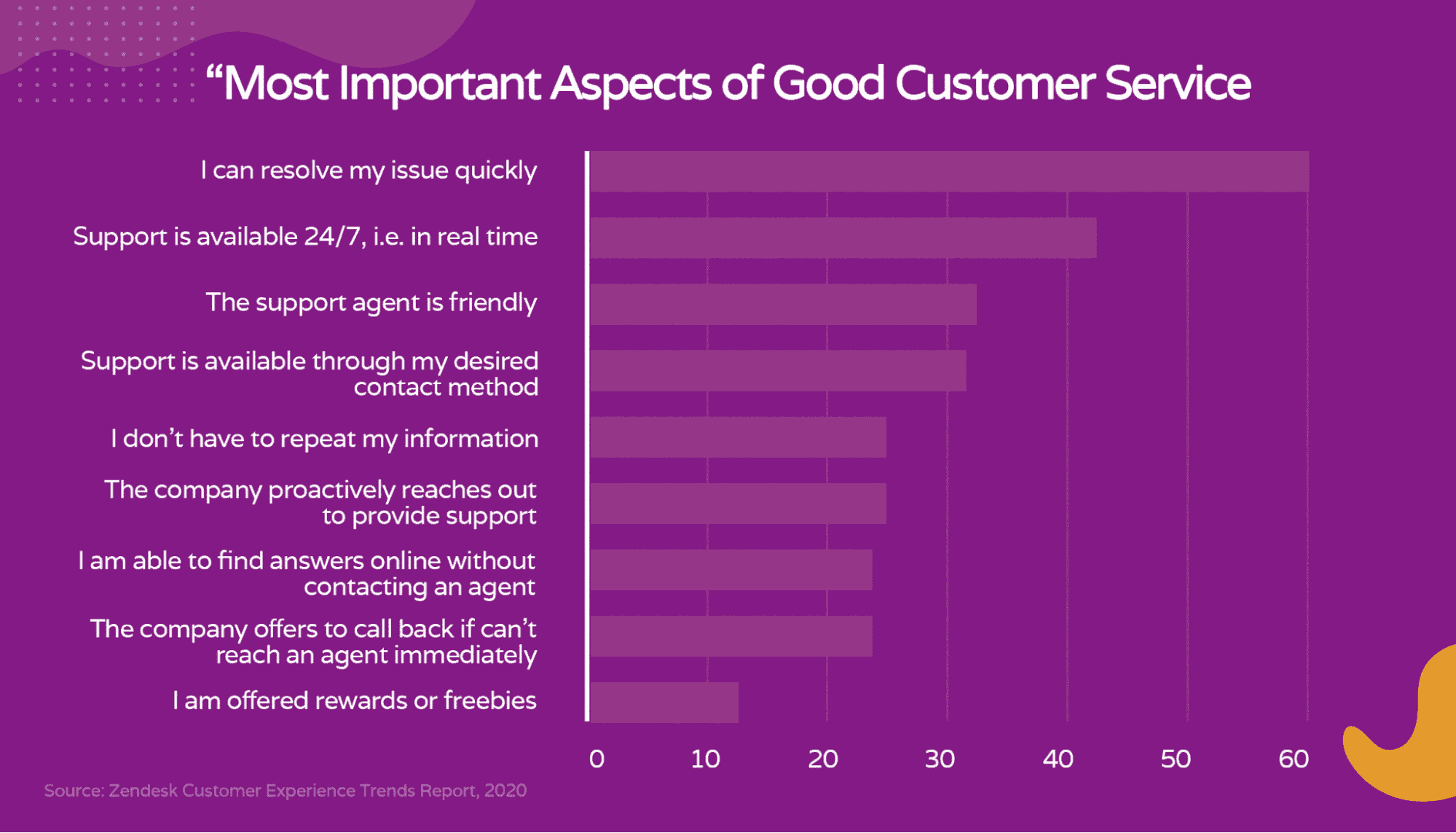
Since your VA will be there to provide speedy assistance to your clients via both phone calls and emails, their problems will be resolved much quicker.
This will lead to high customer satisfaction, and your patients will be far more likely to become loyal to your brand and come back for repeat business.
Saves time
As your office virtual assistant will handle many administrative, repetitive tasks, you, along with your in-house employees, will save a lot of time. You'll be able to focus solely on your tasks.
You’ll get to spend more quality time with your patients — giving them a far better experience and showing them that they matter to your business.
Similarly, your other staff members will be able to spend time on high-impact tasks that can have a positive impact on the growth of your practice.
Reduced workload
Since your staff members will be able to focus on their jobs and main duties, there’ll be less pressure on them.
This will directly impact your work environment as employees will be happier — meaning you’ll have a far better company culture.
Due to their lessened workloads, in-house employees will also be far more productive, and business processes will run smoother as everyone's tasks will be done on time.
Why hire a virtual assistant over a full-time assistant?
Aside from lower costs (which we’ll get into next), there are many other reasons you should consider hiring a virtual assistant over an in-office assistant.
Increased productivity
Often, when employees are together in person and get to interact face-to-face, it can lead to a lot of time wasted on catching up, talking about their personal lives, and unnecessary chit-chat.
When your virtual assistant works remotely, there won’t be any temptation for them to waste time chatting with you or your other employees — and more work can be done in less time.
No extra office space or equipment
A virtual assistant will lead to lower expenses since they won’t require a working space, equipment, or a parking spot.
Since they’re independent contractors, they’re responsible for buying and maintaining their own equipment and having a decent internet connection.
Exceptional technical skills
Since virtual assistants already know the ins and outs of working on computers and how to use different types of software, they’ll have an easy time learning your processes and software.
As a result, onboarding will be much faster, and business operations can continue as usual much sooner. They may even be able to teach you and your team about a few of their processes and tools that could benefit your practice.
Virtual assistant costs vs. full-time assistant costs
On average, full-time, office-based assistants make an hourly rate of just over $19 or close to $39,700 per year.
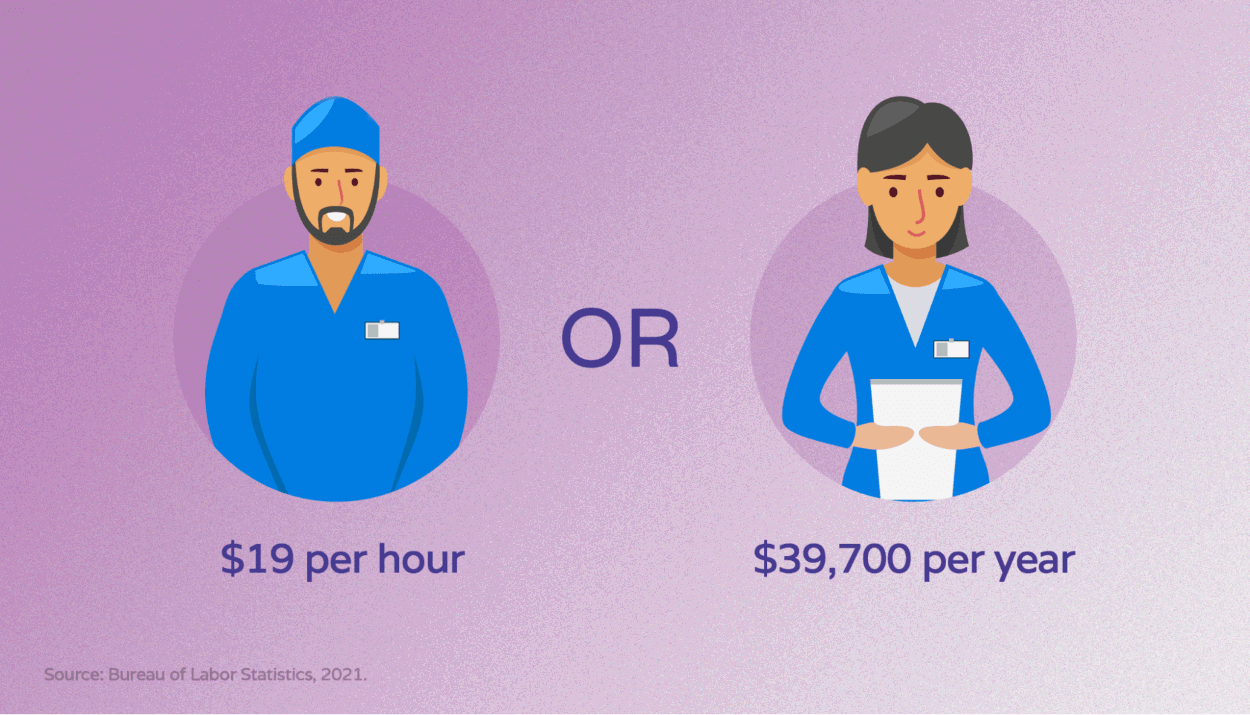
However, their salaries can depend on location, years of experience, and skills.
Location
Administrative assistants in certain locations can earn far more than those in other locations. For example, in the United States, assistants in Alaska, California, Washington, North Dakota, Minnesota, New York, Massachusetts, and Connecticut can earn 5%–14% more than average.
On the other end of the spectrum, administrative assistants in states such as Alabama, Florida, Kansas, Montana, Michigan, Oklahoma, and others can earn 5%–14% less than average.
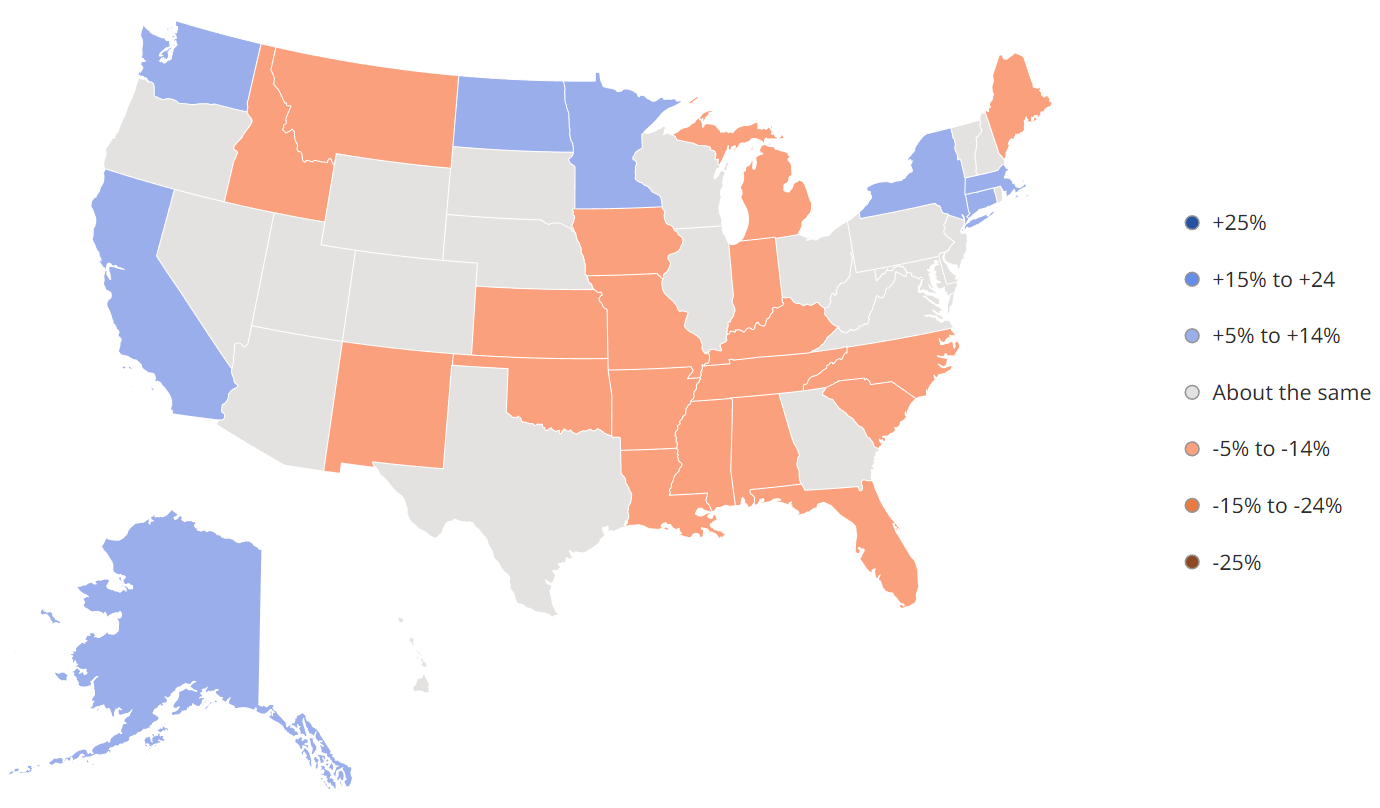
Experience
Admin assistants can also earn more or less depending on their level of experience. For example, administrative assistants with 10+ years of experience can earn over $3 more per hour than those who have less than a year of experience.
That comes out at around $24 more per day (if they work eight hours a day) and around $480 more per month.
Skills
Administrative assistants with certain skills can also earn more. Some of the most notable skills include:
- ArcView - Assistants with this skill can earn a whopping 148.82% more than average.
- TWIC card - Assistants with this skill earn 16.85% more.
- Business degree - Those with a business degree can earn up to 7.69% more.
On the other hand, when you hire a virtual office assistant from Hello Rache, you pay a flat fee of $9.50 per hour. You’ll be able to pay by the hour for an experienced, highly trained VA without having to sign a contract.
Furthermore, you can pick who you work with, get access to time tracking and monitoring, and you’ll be able to cancel anytime.
What skills to look for when hiring a virtual assistant
Here are some of the top skills you need to look out for when hiring a virtual assistant.
Customer service skills
A VA needs to have exceptional customer service skills. This means they need to be able to help the client with all their queries and build meaningful connections with them.
This also means that they need to give swift replies and answer phone calls and emails in a timely manner so that clients aren’t left confused or frustrated.
Communication skills
Your virtual assistant must be great at communicating verbally and non-verbally.
They need to be able to effectively communicate key points and instructions to your customers and also need to be able to type out professional emails.
Their communication skills will also come in handy if they’re responsible for handling your social media profiles, as they’ll be able to keep your followers engaged.
Detail-oriented
They need to pay great attention to detail. Since your practice works with patients who often need special medication and treatments, they’ll need to be able to identify any discrepancies and make sure that every client is provided with the right information.
Listening skills
Since you’ll give your assistant many tasks to perform daily, weekly, or monthly, they need to be able to listen to instructions.
Furthermore, they need to listen to your clients so that they can properly resolve any issues that arise.
Time management
Since VAs often need to juggle the work of several different clients, it’s essential for them to be great at multitasking and managing their time.
They need to be able to prioritize certain tasks to ensure that all their work is done properly and on time for all their clients.
Computer skills
Lastly, they need to be great with computers. This includes them knowing how to use different computer systems and programs.
They’ll need to be familiar with the latest computer applications relevant to the healthcare and customer service industries to provide the best service possible.
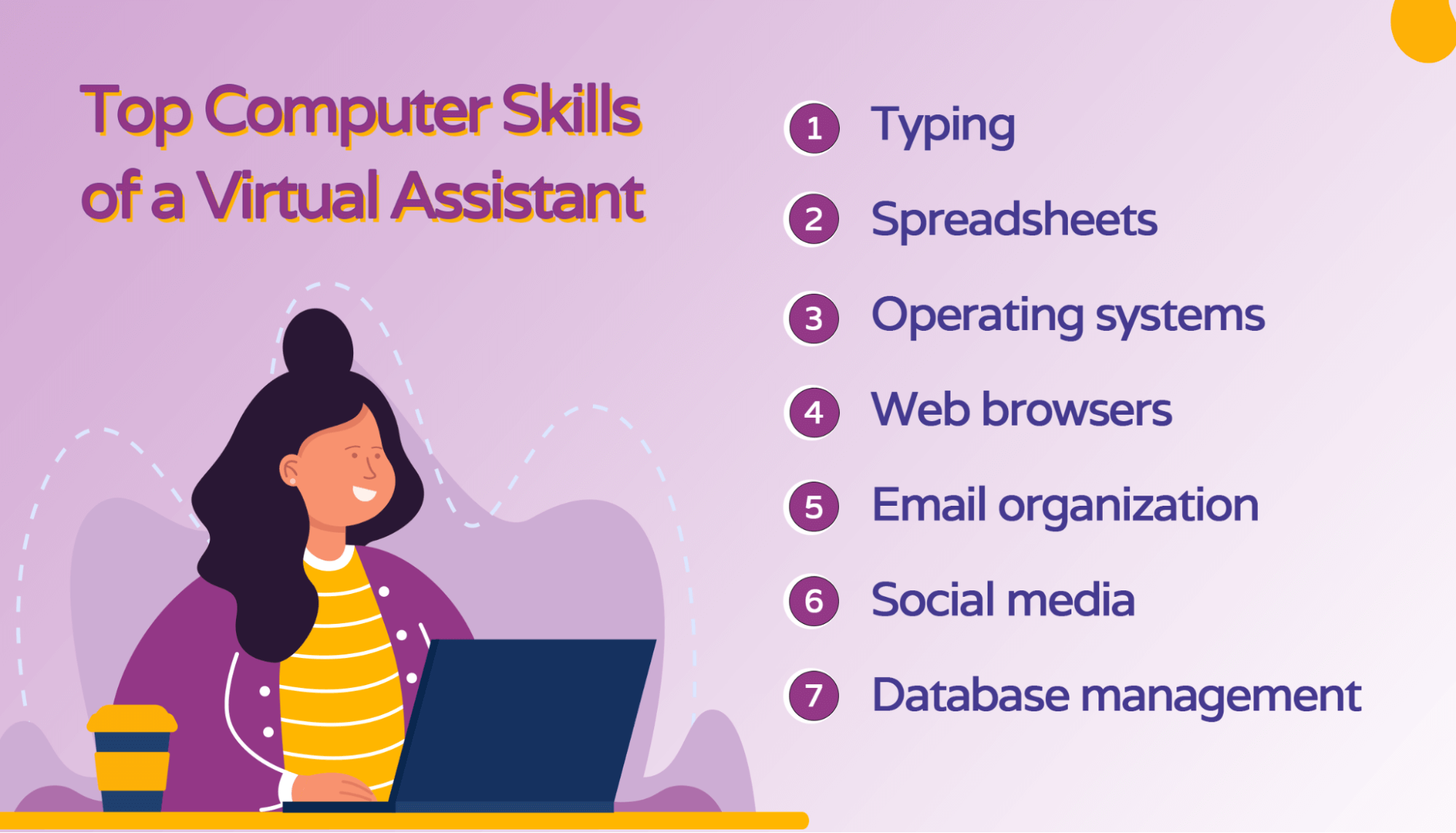
Hire a virtual office assistant today
Hiring a virtual office assistant will do wonders for your practice's productivity, profitability, and overall growth.
By hiring a virtual assistant from a virtual assistant company, you can rest assured that your VA will be skilled and have the experience to help you gain a competitive advantage.
Not sure what a virtual assistant company is? Learn more about what a virtual assistant company is, what services it provides, and how to choose the best one for your practice. Hint: we’d go for HelloRache.




